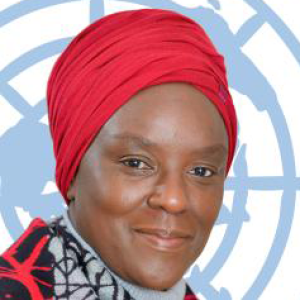International Migrants Day
Speech by the UN Resident Coordinator on International Migrants day
His Majesty King Letsie III
The Right Honourable the Prime Minister of the Kingdom of Lesotho
Honourable President of Senate
Honourable Speaker of the National Assembly
His Lordship the Chief Justice
Honourable Deputy Prime Minister
Honourable members of his Majesty’s Cabinet
Honourable Ministers present
Excellencies Heads of Diplomatic Missions and International Organizations
Honourable Members of Parliament
Good Morning to you all
As I address you today, I would like to I recall a profound experience at the Van Rooyens Border Gate, in Mafeteng, like other borders around the country, it is seen as a crossroad of hopes and dreams for many in our communities. There, I spoke with young men and women, each with a story of their migration to South Africa, often crossing illegally in their relentless quest for better lives and opportunities for their families. Their narratives were not just about the journey but also about the longing for a future that honours their dignity and aspirations. These conversations were eye-opening, highlighting the intricate connection between migration and the fabric of our communities.
Therefore this day, designated by the United Nations General Assembly, is not just a date on the calendar. It is a profound reminder of the unyielding human spirit, the pursuit of betterment, and the complexities of global migration that shape our world.
Ladies and gentlemen, it is clear that migration is a reality that touches every corner of our world, with an estimated 281 million people living outside their birth countries as of 2020. In Southern Africa, this phenomenon is particularly pronounced, with over 7.87 million migrants navigating a diverse array of challenges and opportunities. These individuals move for various reasons – from seeking security and economic opportunities to escaping environmental challenges like droughts and floods.
In Lesotho, migration deeply influences our social, economic, and cultural landscapes. Nearly half of our households experience migration firsthand, with a family member living away either within the country or across borders. This widespread mobility highlights the resilience and adaptability of our people, yet it also underscores the complexities and challenges that migration brings to our communities.
The effects of migration on communities in Lesotho are multifaceted. Economically, migration can be a double-edged sword. On one hand, remittances from Basotho living abroad are a critical source of income for many families, contributing to poverty alleviation and economic stability. On the other hand, the departure of skilled and able-bodied individuals can lead to a 'brain drain', impacting local industries and community development.
Socially, the fabric of our communities is reshaped by migration. Families often face separation, which can strain relationships and alter family dynamics. Communities may experience changes in their demographic makeup, leading to shifts in cultural practices and community cohesion. Additionally, the absence of significant portions of the population, particularly the youth, can impact community-led initiatives and local governance structures.
Despite the challenges, migrants from Lesotho have shown remarkable resilience and have made significant contributions to their host countries. They carry with them our rich cultural heritage, becoming ambassadors of our nation and forging connections that span continents.
As we mark International Migrants Day, it is crucial to not only celebrate the contributions of migrants but also to address the challenges faced by their home communities. The UN Family in Lesotho and IOM in Lesotho join hands with the global community in this observance, taking the opportunity to reevaluate and strengthen our migration policies. We aim to ensure these policies protect migrants' rights and address the needs of communities affected by migration.
On this International Migrants Day, let us honor both the courage and the contributions of migrants. Let us also commit to addressing the adversities they face. By doing so, we not only celebrate their achievements but also work towards a world where migration is a choice, not a necessity born out of desperation.
As we stand together in solidarity with migrants and their families, let us use this observance as a catalyst for action. Let us advocate for policies that ensure the dignity and rights of all migrants are respected. Let us strive to create inclusive societies where the benefits of migration are shared, and the challenges are collectively addressed.
In closing, let us remember that every migrant has a story, a dream, and a right to a life of dignity and safety.
Speech by








